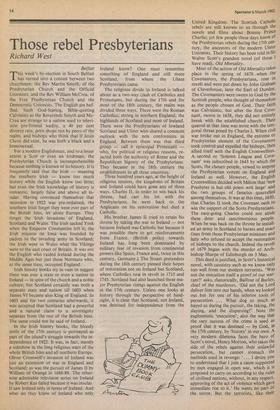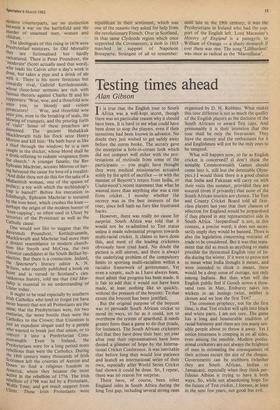Those rebel Presbyterians
Richard West Belfast This week's by-election in South Belfast has turned into a contest between two churchmen: the Rev Martin Smyth, of the Presbyterian Church and the Official Unionists, and the Rev William McCrea, of the Free Presbyterian Church and the Democratic Unionists. The English are baf- fled. Such God-fearing, Bible-quoting Calvinists as the Reverends Smyth and Mc- Crea are strange to a nation used to televi- sion pre-frontal nudity, a 40 per cent divorce rate, porn shops run by peers of the realm, and bishops who think that if Jesus Christ did exist, he was both a black and a homosexual.
For a modern Englishman, and to a lesser extent a Scot or even an Irishman, the Presbyterian Church is incomprehensible because nothing is known of its history. It is frequently said that the Irish — meaning the southern Irish — know too much history while the English know too little; but even the Irish knowledge of history is romantic, largely false and above all in- sular. Having convinced themselves that secession in 1922 was pre-ordained, the southern Irish forget they were ever part of the British Isles, let alone Europe. They forget the Irish invasions of England, Scotland and Wales. The Irish sacked York when the Emperor Constantine left it; the Irish mission on Iona was founded by padres to the invading army in Scotland; the Irish were to Wales what the Vikings were to the east coast of Britain. It was not the English who raided Ireland during the Middle Ages but just those Normans who, at the same time, occupied England.
Irish history books try in vain to suggest there was ever a state or even a nation in Ireland — in spite of the church and a noble culture; but Scotland certainly was both a separate state and nation till 1603 when James VI became also King of England. In 1603 and for two centuries afterwards, it was accepted that Scotland had a powerful and a natural claim to a sovereignty separate from the rest of the British Isles. The same could not be said of Ireland.
In the Irish history books, the bloody strife of the 17th century is portrayed as part of the island's struggle towards the in- dependence of 1922. It was, in fact, merely a sideshow in the long religious wars of the whole British Isles and all northern Europe. Oliver Cromwell's invasion of Ireland was just an extension of war in England and Scotland; as was the pursuit of James II by William of Orange in 1688-89. The other- wise admirable television series on Ireland by Robert Kee failed because it was insular. It saw Ireland only in terms of Ireland. And what do they know of Ireland who only Ireland know? One must remember something of England and still more Scotland, from where the Ulster Presbyterians came.
The religious divide in Ireland is talked about as a two-way clash of Catholics and Protestants, but during the 17th and for most of the 18th century, the realm was divided three ways. There were the Roman Catholics, strong in northern England, the highlands of Scotland and most of Ireland. There were the Presbyterians of lowland Scotland and Ulster who shared a common outlook with the non conformists in England. Between them was that third group — call it episcopal Protestant who, for political or religious reasons, re- jected both the authority of Rome and the Republican bigotry of the Presbyterians. They became in the 18th century the establishment in all three countries.
Three hundred years ago, at the height of religious tension, the kingdoms of Britain and Ireland could have gone any of three ways. Charles II, in order to win back his throne, had cast his lot with the Presbyterians; he went back to the Anglicans on his restoration but died a Catholic.
His brother James II tried to retain his throne by taking the war to Ireland — not because Ireland was Catholic but because it was possible there to get reinforcements from France. (British policy towards Ireland has long been dominated by military fear of invasion from continental powers like Spain, France and, twice in this century, Germany.) The Stuart pretenders during the 18th century pinned their hopes of restoration not on Ireland but Scotland, where Catholics rose in revolt in 1715 and 1745. Scotland had also launched three ma- jor Presbyterian risings against the English in the 17th century. Unless one looks at history through the perspective of hind- sight, it is clear that Scotland, not Ireland, was destined for independence from the United Kingdom. The Scottish Catholic rebels are still known to us through the novels and films about Bonnie Prince Charlie; yet few people these days know of the Presbyterian rebels during the 17th cen- tury, the ancestors of the modern Ulster Unionists. Their history has been told in Sir Walter Scott's grandest novel (of those I have read), Old Mortality.
Most of the action of Old Mortality takes place in the spring of 1679 when the Covenanters, the Presbyterians, rose in revolt and were put down by John Graham of Claverhouse, later the Earl of Dundee. The Covenanters were sworn to God by the Scottish people, who thought of themselves as the people chosen of God. Their faith was Calvinistic, but after the first Cove- nant, sworn in 1638, they did not entirelY break with the established church. Their quarrel at that time was more with the tem- poral threat posed by Charles I. When civil war broke out in England, the extreme or Presbyterian element of the Covenanters took control and expelled the bishops, then allied itself with the English Cromwellites. A second or 'Solemn League and Cove- nant' was subscribed in 1643 by which the Scots, the chosen people, vowed to impose the Presbyterian system on England and Ireland as well. However, the English Cromwellites decided with Milton that 'new Presbyter is but old priest writ large' and the two groups of fanatics quarrelled among themselves. It was at this time, 1650, that Charles II took the Covenant oath to win the support of the Scots Presbyterians. The easy-going Charles could not abide these dour and sanctimonious people. When he was back on the throne he install- ed an army in Scotland to harass and exact fines from those Presbyterian ministers and laity who refused to accept the restoration of bishops to the church. Indeed the revolt of 1679 began with the murder of Arch- bishop Sharpe of Edinburgh on 3 May.
This deed is justified, in Scott's historical novel, with casuistry such as we know only too well from our modern terrorists. 'Was not the execution itself a proof of our war- rant?' asks, rhetorically, Balfour of Burley, chief of the murderers. 'Did not the Lord deliver him into our hands, when we looked out but for one of his inferior tools of persecution ... What dog so much as bayed us during the pursuit, the taking, the slaying, and the dispersing?' Note the euphemistic 'execution'; also the way that the very success of the crime is used as proof that it was destined — by God, in the 17th century, by 'history' in our own. A very modern dilemma faces the hero of Scott's novel, Henry Morton, who takes the side of the rebels against their unlawful persecution, but cannot stomach the
methods used in revenge: I desire you to understand that I join a cause supported by men engaged in open war, which it is proposed to carry on according to the rules of civilised nations, without, in any respect, approving of the act of violence which gave immediate rise to it.' He wants no part of the terror. But the terrorists, like their
modern counterparts, see no distinction between a war on the battlefield and the murder of unarmed men, women and children.
The ideolotgues of this rising in 1679 were Presbyterian' ministers. In Old Mortality they are fictionalised but hardly caricatured. There is Peter Poundtext, the moderate' (Scott actually used that word), who reads his Calvin after a day's work is done, but takes a pipe and a drink of ale with it. There is his more ferocious but cowardly rival, Gabriel Kettledrummle, whose three-hour sermons are rich with furious rhetoric against Charles II and his supporters: 'Woe, woe, and a threefold woe unto you, ye bloody and violent persecutors! ... Woe, and threefold woe unto you, even to the breaking of seals, the blowing of trumpets, and the pouring forth of vials!' Some of these preachers are demented. The ancient Habakkuk Mucklewrath bids his flock seize Henry Morton and kill him: 'He hath burst in like a thief through the window; he is a ram caught in the thicket, whose blood shall be a drink-offering to redeem vengeance from the church.' A younger fanatic, the Rev Phraim Macbriar, accuses Morton of hav- Mg betrayed the cause for love of a royalist: And didst thou not do this for the sake of a Midianitish woman, one of the spawn of Prelacy, a toy with which the archbishop's trap is baited?' Before his execution in Edinburgh, Ephraim Macbriar is tortured by the iron boot, which crushes the knee Perhaps the origin of the modern horror of knee-capping', so often used in Ulster by terrorists of the Protestant as well as the Catholic cause.
One would not like to suggest that the Reverends Poundtext, Kettledrummle, Mucklewrath and Macbriar had more than a distant resemblance to modern church- men like Smyth and McCrea, the two Unionist candidates at the South Belfast by- election. But there is a connection. Indeed, the Spectator's literary editor A. N. 'Wilson, who recently published a book on Scott and is versed in Scotland's can- tankerous history, told me that Old Mor- tality is essential to an understanding of Ulster today. It ought to be read especially by southern Irish Catholics who tend to forget (or have never learnt) that not all Protestants are the same; that the Presbyterians were, for two centuries, far more hostile than were the Catholics to the Crown; that Unionism is Just an expedient slogan used by a people who wanted to break just that union, or to convert it into a Presbyterian Com- monwealth. Even in Ireland, the Presbyterians were for a long period more rebellious than were the Catholics. During the 18th century many thousands of Irish Scotsmen left the counties of Antrim and Down to find a religious freedom in America, where they became the most active in the rebellion of 1776. The Irish rebellion of 1798 was led by a Protestant, Wolfe Tone, and got much support from Ulster. These Irish Protestants were
republican in their sentiment, which was one of the reasons they asked for help from the revolutionary French. Over in Scotland, in that same Clydeside region which once supported the Covenanters, a mob in 1815 marched in support of Napoleon Bonaparte. Strangest of all to remember:
until late in the 19th century, it was the Presbyterians in Ireland who had the sup- port of the English left. Lord Macaulay's History of England is a panegyric to William of Orange — a shady monarch if ever there was one. The song `Lilliburlero' was once as radical as the `Marseillaise'.







































 Previous page
Previous page